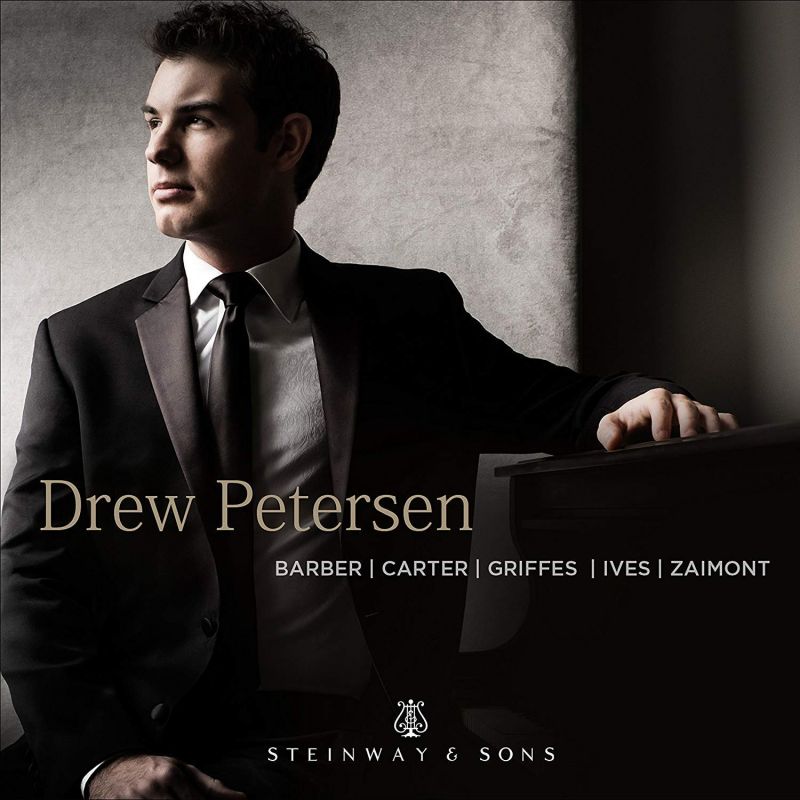Drew Petersen plays Griffes, Ives, Carter, Zaimont, Barber
View record and artist detailsRecord and Artist Details
Composer or Director: (Charles) Grayston Ives, Elliott (Cook) Carter, Judith Lang Zaimont, Samuel Barber, Charles T(omlinson) Griffes
Genre:
Instrumental
Label: Steinway & Sons
Magazine Review Date: AW18
Media Format: CD or Download
Media Runtime: 74
Mastering:
DDD
Catalogue Number: 30095

Tracks:
| Composition | Artist Credit |
|---|---|
| Fantasy Pieces |
Charles T(omlinson) Griffes, Composer
Charles T(omlinson) Griffes, Composer Drew Petersen, Piano |
| Sonata No 2 "Concord Mass 1840-60", Movement: The Alcotts |
(Charles) Grayston Ives, Composer
(Charles) Grayston Ives, Composer Drew Petersen, Piano |
| Sonata for Piano |
Elliott (Cook) Carter, Composer
Drew Petersen, Piano Elliott (Cook) Carter, Composer |
| Attars |
Judith Lang Zaimont, Composer
Drew Petersen, Piano Judith Lang Zaimont, Composer |
Author: Harriet Smith
We begin with the headily Impressionistic Fantasy Pieces of Griffes, which are evocatively coloured, with Petersen particularly relishing the Slavic tinges of the third piece. From Ives’s Concord Sonata he excerpts the luscious third movement, ‘The Alcotts’. It’s played with palpable affection, and the way he references Ives’s appropriation of the ‘fate’ motif from Beethoven’s Fifth without overstating it is just one example of the subtlety of his musicianship. From here we move to the more chewy sound world of post-war Carter, though it’s striking how different this is in effect from Charles Rosen’s classic account of the Sonata. In Petersen’s hands, the opening Maestoso is less craggily monumental, more approachable, while the following Legato scorrevole is warmer than Rosen’s slightly forbidding reading. The fugal second movement, too, is impressive in this new account, with Petersen unfazed by Carter’s often highly complex textures and rhythms.
We come to the present day with Judith Lang Zaimont’s suite Attars, written just last year and translating five flower scents into miniatures of great sensuality. It sits comfortably within the programme as a whole, as if Zaimont had absorbed and updated earlier musical influences – Impressionism in ‘Pink Lotus’ and Carter’s sinew in ‘Jasmine’.
Petersen leaves the most substantial piece till last. Barber wrote his Piano Sonata for Horowitz and at times I was reminded of him in Petersen’s fingery brilliance, not least in the Scherzo. There’s power and sinew without aggression in the opening movement, though I did wonder whether Petersen’s slow tempo for the Adagio mesto made life unnecessarily difficult, possessing gravitas but at the expense of the melodic line. Leon McCawley is altogether more natural-sounding here in his impressive account, though Marc-André Hamelin is in a different league again in the way he sustains the accompaniment while the melody floats free, almost as if the music were without bar lines. But in the fugal finale the young American is unquestionably impressive, bringing to it clarity and, in the madcap coda, unabashed virtuosity.
Discover the world's largest classical music catalogue with Presto Music.

Gramophone Digital Club
- Digital Edition
- Digital Archive
- Reviews Database
- Full website access
From £8.75 / month
Subscribe
Gramophone Full Club
- Print Edition
- Digital Edition
- Digital Archive
- Reviews Database
- Full website access
From £11.00 / month
Subscribe
If you are a library, university or other organisation that would be interested in an institutional subscription to Gramophone please click here for further information.




